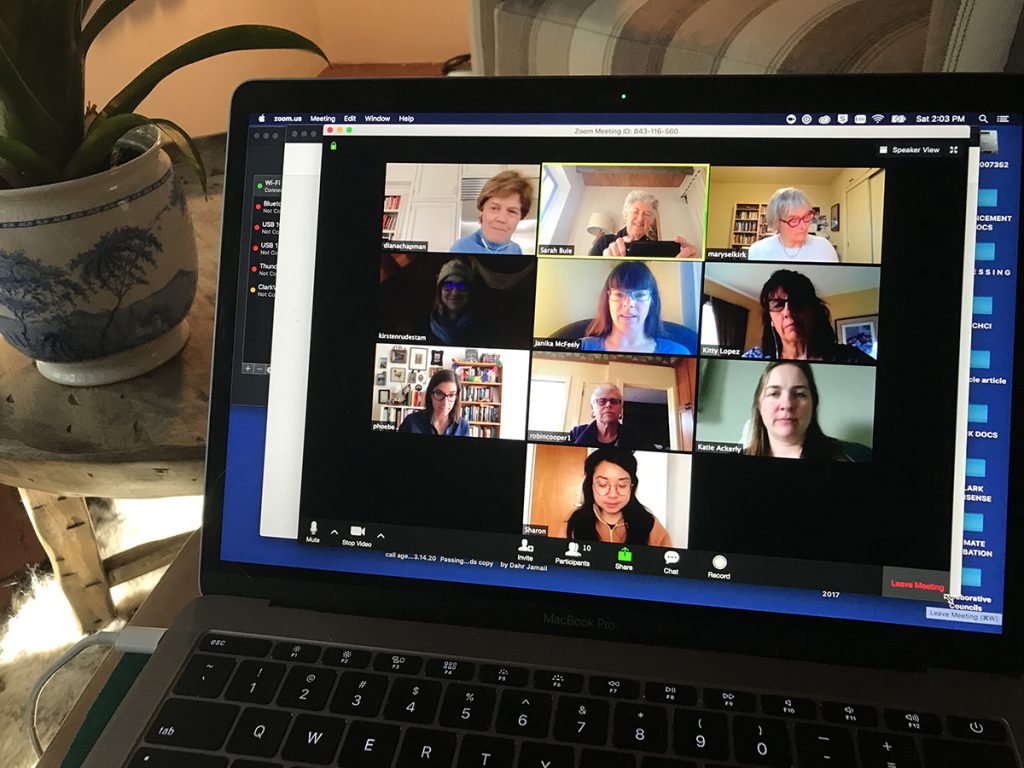#ClarkTogether
Council on the Uncertain Human Future examines links between COVID-19 and climate change

The CUHF will, with A new Earth Conversation, co-host “An Evening of Council in this time of pandemic” on May 19 at 7 p.m.
The Council on the Uncertain Human Future invites people into reflection, collective insight, and reckoning on the climate crisis through a process of intentional conversation. CUHF, launched in 2014 through the Higgins School of Humanities at Clark, is now an international network engaging a wide range of groups in these deeper conversations. It is also the foundation of A new Earth conversation at Clark, a campuswide climate initiative.
Now, as COVID-19 affects lives across the globe, the CUHF is seeing the powerful linkages between the current pandemic and the disruption posed by climate change. Although it has always been held in in-person gatherings, the Council has now moved its meetings to a virtual format. It has also created an online “Reader for these COVID-19 Times,” featuring commentary and reflections from writers who are considering how the pandemic relates to larger planetary conditions and challenges.
The CUHF and NEC now invite all Clark students to join An Evening of Council in this time of pandemic via Zoom on May 19 at 7 p.m.; those who choose to join can share their experiences and consider the broader social, ecological, and climate challenges together.
“We really want to create a space for the students to be able to process how this is affecting them personally and in their professional and life planning,” says Michelle Sayles, CUHF/NEC assistant director. “This is disrupting so many things we take for granted, and it’s helping us make more tangible what we’ve talked about in the Council process.”
Sarah Buie, professor emerita and research scholar at Clark’s Department of Visual and Performing Arts and a founding convener of CUHF, says the current situation is likely a compressed version of what we may continue to see in ongoing ways.
“This may be the first of more pandemics; it is remarkable and revealing that we’re forced to stop our economy, because our impact on the natural world is lessened. We can see the healing that’s possible if we could pull back from the mindless plunder of the planet that is typically underway,” she says.
The “Reader for these COVID-19 Times” continues to grow daily. It includes links to articles, podcasts, videos, and poems about the pandemic and climate crisis. “There was wisdom pouring forth from so many sources that it felt important to put it together,” Buie says. “It’s obvious we need to be deepening our own reflection at this time, and many thought leaders are giving us opportunities to do that with them.”
Buie suggests that, though distinct in their particulars, the pandemic and the climate crisis both arise from the assumption that humans may endlessly exploit the natural world, despite our interdependence with it. “In both instances, we’re being shown that unchecked capitalism will disrupt and ultimately destroy the ecological health of the planet,” she says. “Tragically, it is a kind of unconscious collective suicide.”
As we begin to heal from the pandemic, Sayles says we must ensure that the recovery process doesn’t further reinforce the existing conditions that have brought us to this point. That involves contemplating what a just transition looks like – taking into account the issue of inequality and what we’re asking of the most marginalized in this moment.
The Council on the Uncertain Human Future involves slowing down, reckoning together, and listening for collective wisdom. In this unfolding crisis, Buie says an important first step is to let ourselves slow down and reflect.
“We have been moving so fast,” she says. “May we, slowed and altered by the pain and suffering now underway, be forced to put down our assumptions, and see their costs. May we work to re-envision our societies, interwoven and in balance with the life systems of this incredible planet.”


